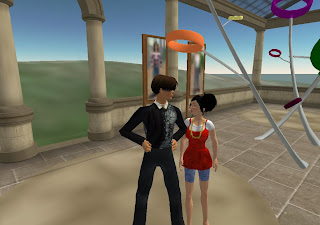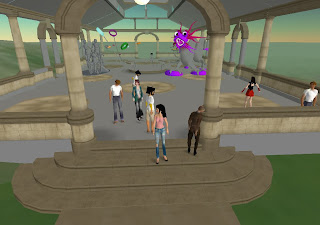
The communication world kick-started with little forms of sending messages that they had over great distances- homing pigeons, smoke signals, the Morse code, and telegrams. However as the world modernized, communication had to progress to cope with the developing demands of a new era. Snail mail made things a little easier but it wasn’t enough. The breakthrough in technology came when the electronic mail was born. As contrary to popular beliefs, email predates the Internet; existing email systems were a crucial tool in creating the Internet as early as 1961. (E-mail, 2006) Practical implementations of the World Wide Web began only during the late 1960’s and 1970’s. (History of the Internet, 2006) Electronic mail started off being a file directory. It works by putting a message in another user's directory in a place where they could see it when they logged in. (The History of Email, 2004) Unfortunately, email could only be used to send messages to various users of the same computer. Then in 1972, Ray Tomlinson who worked for Bolt Beranek and Newman as an ARPANET contractor chose the "@" symbol to combine the user and host names, thus coming up with the notation "user@host'. (Email History, 2000) Messages could now be sent from one computer to another.
The 1998 romantic comedy, “You've Got Mail” distinctly opens with Meg Ryan's Kathleen Kelly and Tom Hank's Joe Fox zooming in on their laptops, logging into AOL, and anticipating the words, "You've got mail" eagerly once their partners leave for work. This demonstrates the influence that email has over people; their uncontrollable need to check their mails first thing in the morning above anything else. Although real time communication has become more popular, the email’s humble beginnings have played a part in the development of the Internet. After Tomlinson’s invention, only computers that were networked could use email. That is why only businesses had email because home computers didn’t exist until the early 1980’s. That was before the Internet, so the only way home computers could send email was by dialing into the same large computer and swapping messages. (Email, 2004) This in turn spurred the development of the Internet to allow home computers to be networked in order to connect people from all geographical locations. Email took us from ARPANET to the Internet. Individuals can be virtually connected to everyone via private email or public real-time chat. Together with the World Wide Web, email started to be made available with free web clients by providers such as Hotmail, Yahoo, and Gmail. That's the email that all are familiar with today. In fact, the word “email” has become synonymous with the Internet.
The evolution of the electronic mail has brought people beyond the initial requirements of maintaining a network. It has become such an important tool in the I.T world that its uses are often exploited. Certain companies who think that they can use the Internet as an advertisement opportunity abuse the use of email by sending unsolicited mail known as spam. Yes, compared to the new and better technologies like instant messaging, email is inefficient; it’s chaotic and pretty much out of date. Yet, in spite of these shortcomings, one can assume with confidence that email is still the preferred method of collaborating and sharing information with others. Statistics show an estimated amount between 32 and 62 billion emails are sent around the world each day. (Ask Yahoo, 2006) Email is almost universal. Everyone has it and everyone uses it. While instant messaging is a rage with young people nowadays, the older generation is less likely to know how to use it unlike email. Also, it is accessible everywhere as long as the Internet is around. You can send an email to a Mac, Windows, UNIX box, cellphone, etc. and still be able to read it. In addition, companies are more liable to use email in the office to reach out to its employees rather than instant messaging that is often restricted. Email is and will continue to be a primary means of communication around the work place.
It does not matter that more people are leaning towards real time online communication. Email remains as the most important application of the Internet and the most widely used facility it has. It may not remain as the best in the future but as far as many are concerned, email is probably the best thing that has happened to the evolution of the Internet.
References:
Ask Yahoo. (2006). Retrieved January 26, 2006, from
http://ask.yahoo.com/20060324.htmlClayton. (2004). Email. Retrieved January 26, 2006, from
http://library.thinkquest.org/04oct/00451/email.htmCrocker, D. (2000). Email History. Retrieved January 26, 2006, from
http://www.livinginternet.com/e/ei.htmE-mail. (2006). Retrieved January 26, 2006, from
http://en.wikipedia.org/wiki/EmailHistory of the Internet. (2006). Retrieved January 26, 2006, from
http://en.wikipedia.org/w/index.php?title=History_of_the_Internet&oldid=70771572Peter, I. (2004). The History of Email. Retrieved January 26, 2006, from
http://www.nethistory.info/History%20of%20the%20Internet/email.htm


 Oh, so he did.
Oh, so he did.
 Stoning.
Stoning. And still stoning.
And still stoning. After my extreme makeover I felt so much better. No more china doll wannabe!
After my extreme makeover I felt so much better. No more china doll wannabe! The last person whom I got hold of for a snapshot turned out to be classmate Daphne's character Velvet.
The last person whom I got hold of for a snapshot turned out to be classmate Daphne's character Velvet. What a coincidence. Finally, a friend!
What a coincidence. Finally, a friend! And one final momento of that horrid place Morris.
And one final momento of that horrid place Morris. 






